高中英语 必修四全单元 词汇复习Unit1-5
人教版高中英语必修4重点词汇、短语、句型、语法大全完整版完整版.doc
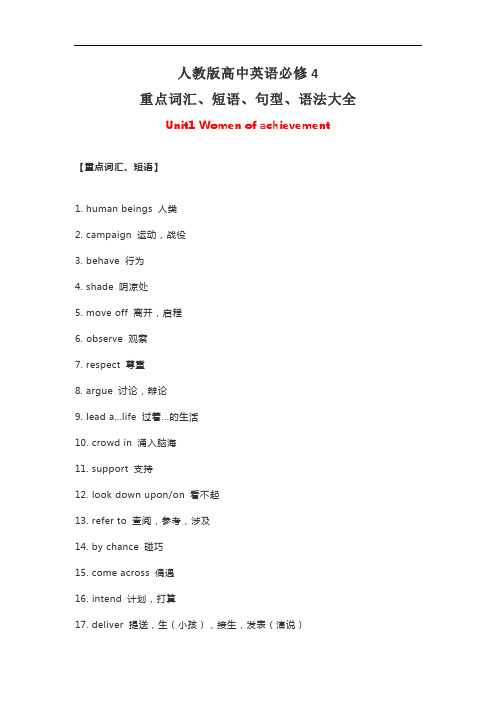
人教版高中英语必修4重点词汇、短语、句型、语法大全Unit1 Women of achievement【重点词汇、短语】1. human beings 人类2. campaign 运动,战役3. behave 行为4. shade 阴凉处5. move off 离开,启程6. observe 观察7. respect 尊重8. argue 讨论,辩论9. lead a...life 过着…的生活10. crowd in 涌入脑海11. support 支持12. look down upon/on 看不起13. refer to 查阅,参考,涉及14. by chance 碰巧15. come across 偶遇16. intend 计划,打算17. deliver 提送,生(小孩),接生,发表(演说)18. carry on 继续,坚持【重点句型】1. She also discovered how chimps communicate with each other and her study of their body language helped her work out their social system.她还发现了黑猩猩之间是如何交流的,而她对黑猩猩身势语的研究帮助她弄清楚了黑猩猩的社会体系。
△work out 解决、解答、计算出;产生结果、发展;锻炼;作出、制订出2. She is leading a busy life but she says …她过着忙碌的生活,但是她说……△lead a …life = live a …life 过……的生活3. Many people look down upon poor people. 很多人瞧不起穷人。
△ look down upon / on 蔑视;轻视;瞧不起You mustn’t look down upon/ on the disabled.你绝不能瞧不起残疾人。
人教新课标必修4核心词汇梳理并重点训练
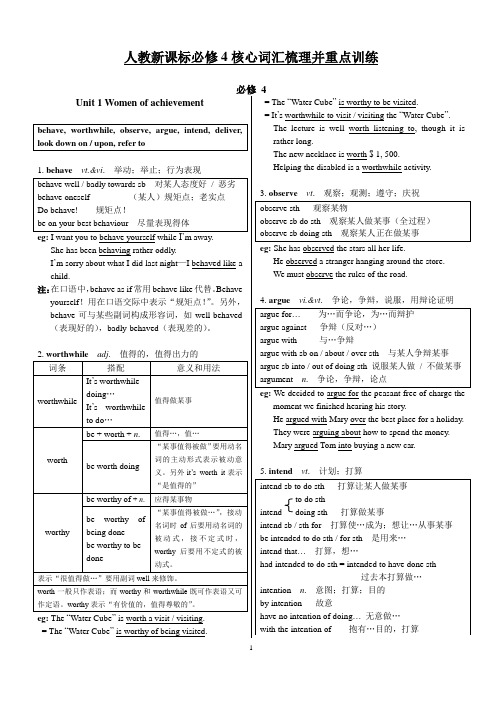
人教新课标必修4核心词汇梳理并重点训练必修 4Unit 1 Women of achievementI want you to behave yourself whileShe has been behaving rather oddly.I’m sorry about what I did last night—I behaved like a child.注:在口语中,behave as if常用behave like代替。
Behave yourself!用在口语交际中表示“规矩点!”。
另外,behave可与某些副词构成形容词,如well-behaved (表现好的),badly-behaved(表现差的)。
eg: The “Water Cube” is worth a visit / visiting. = The “Water Cube” is worthy of being visited. = The “Water Cube” is worthy to be visited.= It’s worthwhile to visit / visiting the “Water Cube”. The lecture is well worth listening to, though it is rather long.The new necklace is worth $ 1, 500.Helping the disabled is a worthwhile activity.She has observed the stars all her life.He observed a stranger hanging around the store.We must observe the rules of the road.We decided to argue for the peasant free of charge the moment we finished hearing his story.He argued with Mary over the best place for a holiday. They were arguing about how to spend the money. Mary argued Tom into buying a new car.Do you intend making / to make a long stay here? This gift is intended for you.I intended to have gone to Beijing, but I didn ’t get the ticket.6. deliver v . 投递,发表,宣布,接生,生(小孩)(仅Would you deliver my message to your mother?She is due to deliver a lecture on genetic engineering. I ’m having some flowers delivered for her birthday. She was delivered of a healthy baby.eg: You mustn ’t look down upon the disabled. I ’m looking forward to working with you.Most people look on the government ’s promises with complete belief.As I looked through the newspapers, I found some useful information.You may refer to your notes if you want. My doctor referred me to a specialist.Did you hear all the nasty references to me that Janet kept making?I am writing with reference to your job application. 注:refer to 和consult 后直接带书籍、词典等名词,而look up (查阅)后面跟所要查找的词作宾语,如lookup a word in a dictionary 。
2020届高三英语一轮复习必修4Unit 1~Unit 5知识总结

人教版必修4Unit 1~Unit 5Unit 1Women of achievementⅠ.单词回顾(一)拓展单词1.shade n. 荫;阴凉处v t. 遮住光线→shelter n.居所;住处;遮蔽物2.intend v t. 计划;打算→intention n. 目的;意图3.childhood n. 童年;幼年时代→childish adj.孩子的;孩子气的4.outspoken adj. 直言的;坦诚→outgoing adj.友好的;外向的5.respect v t. & n. 尊敬;尊重;敬意→respectable adj. 体面的;值得尊敬的→respectful adj. 尊敬的;表示敬意的6.entertainment n. 款待;娱乐;娱乐表演→entertain v t. 使娱乐7.support n.&v t. 支持;拥护→supportive adj.支持的;拥护的8.considerate adj. 考虑周到的→consider v t. 考虑;体谅→consideration n. 考虑9.deliver v t. 递送;生(小孩儿);接生;发表(演说等)→delivery n. 运送10.achievement n. 成就;功绩→achieve v t. 取得;实现11.connection n. 连接;关系→connect v t. 联系→connected adj. 有联系的12.organization n. 组织;机构;团体→organize v t. 组织13.behave v t.&v i. 举动;表现→behaviour n. 行为;举止14.observe v t. 观察;遵守;观测→observation n. 观察;观测15.argue v t.&v i.讨论;辩论;争论→argument n. 争论;争辩;争吵16.crowd n. 人群;观众v t. 挤满;使拥挤→crowded adj. 拥挤的17.refer v i. 谈到;查阅;参考→reference n. 查阅;参考18.inspire v t. 鼓舞;激发;启示→inspiring adj. 令人鼓舞的→inspired adj. 有灵感的;受鼓舞的→inspiration n. 鼓舞;灵感(二)重点单词1.project n.项目;工程;规划2.generation n.一代;一辈3.campaign n.运动;战役v i.作战;参加运动4.emergency n.突发事件;紧急情况5.worthwhile adj.值得的;值得做的6.specialist n.专家;专业工作者7.institute n.学会;学院;协会8.welfare n.福利;福利事业9.modest adj.谦虚的;谦让的;适度的10.audience n.观众;听众;读者11.career n.事业;生涯【联想】1.名词+-hood 后缀变名词①child→childhood 童年②boy→boyhood 少年时代③man→manhood 男子气概④brother→brotherhood 手足之情⑤adult→adulthood 成年⑥neighbour→neighbourhood 邻里;街坊2.动词+-ment 后缀变名词①argue→argument 争论②achieve→achievement 成就③entertain→entertainment 款待;娱乐④equip→equipment 设备⑤move→movement 移动;运动⑥enjoy→enjoyment 享受;乐趣⑦state→statement 陈述;说明⑧amuse→amusement 娱乐;消遣3.以-ist为后缀的高频名词全接触①art→artist 艺术家②piano→pianist 钢琴家③tour→tourist游客④science→scientist科学家⑤journal→journalist 新闻工作者;记者⑥social→socialist社会主义者⑦special→specialist专家⑧psychology→psychologist心理学家4.以-ency结尾的高频名词小结①emergent→emergency 紧急情况②fluent→fluency 流利;流畅③frequent→frequency 频率④efficient→efficiency 效率⑤tend→tendency 趋向;趋势5.表示“同意”与“反对”的高频单词集锦①disagree v i.不同意②object v i.反对;不赞成③oppose v t.反对;反抗;抵抗④reject v t.抛弃;排斥;拒绝;驳回;否决⑤support n. & v t.支持;拥护⑥agree v i.同意⑦approve v t. & v i.批准;赞成Ⅱ.短语回顾1.move_off 离开;起程;出发2.lead/live a...life 过着……的生活3.crowd_in (想法、问题等)涌上心头;涌入脑海4.look_down_upon/on 蔑视;瞧不起5.refer_to 查阅;参考;谈到6.by_chance 碰巧;凑巧7.come_across (偶然)遇见;碰见8.carry_on 继续;坚持9.devote...to... 献身于……;专心于……10.work_out 解决;锻炼身体;结果是11.catch_one's_eye 吸引某人的注意12.fight_for 为……而战【联想】1.“v.+off”短语速记①move off 离开;出发②pay off 还清;取得好结果③put off 推迟④show off 炫耀;卖弄⑤take off 起飞;脱掉⑥give off 发出(光、热、气味等)⑦set off 出发;爆炸2.by 相关短语①by chance 碰巧②by accident 偶然地;意外地③by design 故意地④by weight 按重量计算⑤by nature 生来;天生地⑥one by one 一个接一个地⑦step by step 一步一步地3.“动词+on”必备短语一览①carry on 继续;坚持②keep on 继续前进/工作③live on 继续存在;靠……为生④go on 前进;继续⑤move on 继续前进⑥insist on 坚持⑦pass on 传递Ⅲ.佳句必背1.“only+状语”置于句首倒装Only_after her mother came to help her for the first few months was_she_allowed to begin her project.她母亲头几个月来帮她的忙,这才使她得以开始自己的计划。
人教版高中英语必修四词汇表(1-5单元)(含教材例句及词汇用法讲解)
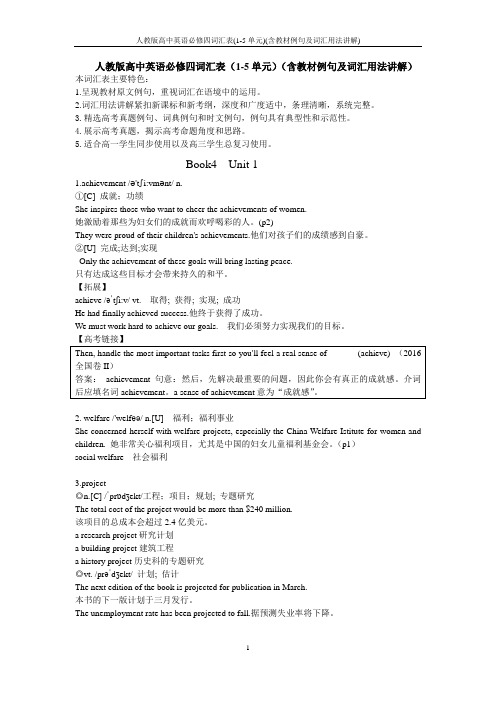
人教版高中英语必修四词汇表(1-5单元)(含教材例句及词汇用法讲解)本词汇表主要特色:1.呈现教材原文例句,重视词汇在语境中的运用。
2.词汇用法讲解紧扣新课标和新考纲,深度和广度适中,条理清晰,系统完整。
3.精选高考真题例句、词典例句和时文例句,例句具有典型性和示范性。
4.展示高考真题,揭示高考命题角度和思路。
5.适合高一学生同步使用以及高三学生总复习使用。
Book4 Unit 11.achievement /ə'tʃi:vmənt/ n.①[C] 成就;功绩She inspires those who want to cheer the achievements of women.她激励着那些为妇女们的成就而欢呼喝彩的人。
(p2)They were proud of their children's achievements.他们对孩子们的成绩感到自豪。
②[U] 完成;达到;实现Only the achievement of these goals will bring lasting peace.只有达成这些目标才会带来持久的和平。
【拓展】achieve /əˈtʃi:v/ vt. 取得; 获得; 实现; 成功He had finally achieved success.他终于获得了成功。
We must work hard to achieve our goals. 我们必须努力实现我们的目标。
2. welfare /'welf eə/ n.[U] 福利;福利事业She concerned herself with welfare projects, especially the China Welfare Istitute for women and children. 她非常关心福利项目,尤其是中国的妇女儿童福利基金会。
(p1)social welfare 社会福利3.project◎n.[C] /ˈprɒdʒekt/工程;项目;规划; 专题研究The total cost of the project would be more than $240 million.该项目的总成本会超过2.4亿美元。
新课标必修四全单元词汇复习Unit1-5

Unit 1一词组互译1. 献身于_______________2. 醒来________________3. 蔑视; 瞧不起_________________4. 照顾; 喜爱______________5. 接生_____________6. 使自己参与; 关心______________7.偶然遇见______________8.前提是,如果___________ 9引起某人注意___________10.也,又,和____________11. argue for ____________12. do research on_______________ 13. of one’s own _________14. move off _____________15. carry on _________________ 16. be intended for ____________ 17. By chance_____________ 18crowd in _____________ 19.lead a...life___________ 20.refer to_____________二完成句子●他把一生都奉献在帮助残疾人事业上.He _________ all his life ________ _________the disabled people.●这本字典是给小孩用的.(be intended to )The dictionary _______ ________ ________ children.●他对细节不关心He________ ________ ________ ________ the details.4.我希望你不要看不起这种工作I hope you ______ _______ ________ _______ this kind of work.5.努力改善这个工厂工人们的劳动条件是值得做的事_____ _______ ________to improve the working conditions for the workers of this factory.6.他打算早上起程。
高中英语必修四第1-5单元重点词汇及语法(完整版)
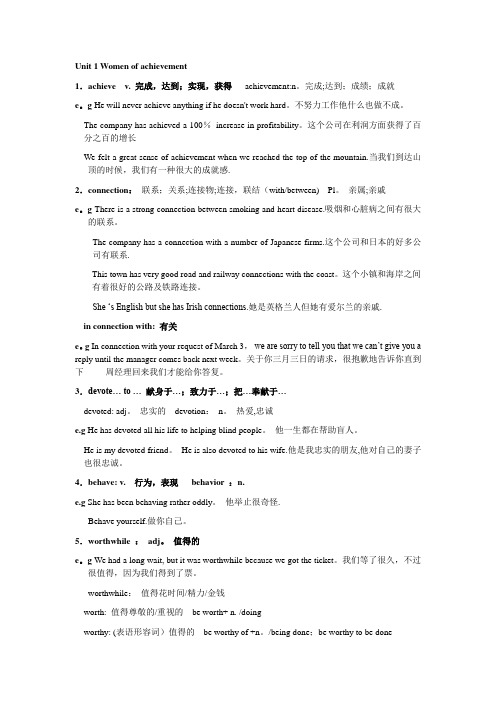
Unit 1 Women of achievement1.achieve v. 完成,达到;实现,获得achievement:n。
完成;达到;成绩;成就e。
g He will never achieve anything if he doesn't work hard。
不努力工作他什么也做不成。
The company has achieved a 100%increase in profitability。
这个公司在利润方面获得了百分之百的增长We felt a great sense of achievement when we reached the top of the mountain.当我们到达山顶的时候,我们有一种很大的成就感.2.connection:联系;关系;连接物;连接,联结(with/between) Pl。
亲属;亲戚e。
g There is a strong connection between smoking and heart disease.吸烟和心脏病之间有很大的联系。
The company has a connection with a number of Japanese firms.这个公司和日本的好多公司有联系.This town has very good road and railway connections with the coast。
这个小镇和海岸之间有着很好的公路及铁路连接。
She ‘s English but she has Irish connections.她是英格兰人但她有爱尔兰的亲戚.in connection with: 有关e。
g In connection with your request of March 3,we are sorry to tell you that we can’t give you a reply until the manager comes back next week。
高中高一英语必修4(四)各单元重点知识点归纳可打印版
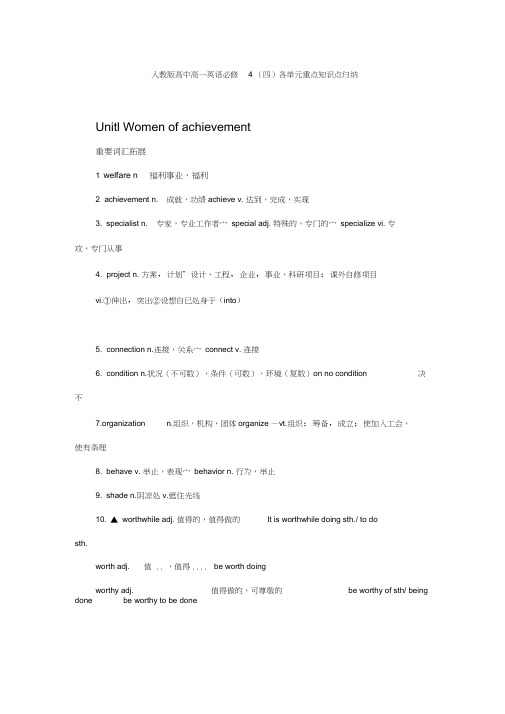
人教版高中高一英语必修 4 (四)各单元重点知识点归纳Unitl Women of achievement重要词汇拓展1 welfare n 福利事业,福利2 achievement n. 成就,功绩achieve v. 达到,完成,实现3. specialist n. 专家,专业工作者宀special adj. 特殊的,专门的宀specialize vi. 专攻,专门从事4. project n. 方案,计划”设计,工程,企业,事业,科研项目;课外自修项目vi.①伸出,突出②设想自已处身于(into)5. connection n.连接,关系宀connect v. 连接6. condition n.状况(不可数),条件(可数),环境(复数)on no condition 决不anization n.组织,机构,团体organize —vt.组织;筹备,成立;使加入工会,使有条理8. behave v. 举止,表现宀behavior n. 行为,举止9. shade n.阴凉处v.遮住光线10. ▲ worthwhile adj. 值得的,值得做的It is worthwhile doing sth./ to dosth.worth adj. 值 .. ,值得.... be worth doingworthy adj. 值得做的,可尊敬的be worthy of sth/ being done be worthy to be done11. observe v. 观察,观测,遵守observatio n n. 观察,观测12. respect v./n. 尊敬,尊重,敬意respectable adj. 值得尊敬的,正派的,体面地T respectful adj. 有礼貌的,恭敬的13. argue .v. 争论,辩论T argument n. 争论,辩论argued-adj 引起争论的14.entertainment-n 款待,娱乐entertain-v 款待;招待,娱乐,抱有,怀着(想法、疑问)15. crowd n. 人群,观众v.挤满,使拥挤T crowded adj. 拥挤的16. in spire v. 鼓舞,激发T in spired adj. 受到鼓舞的,有灵感的T in spiri ng adj. 鼓舞人的T inspiration n. 鼓舞,灵感17 support v. 支持,拥护T supporter n. 支持者,拥护者18.refer-vi 谈到,查阅,参考19.i ntend v. 计划,打算T intention n. 打算,目的,意图20. considerate adj. 考虑周到的T consider v. 考虑,认为T consideration n 考虑,体谅T considering prep 考虑至U21.ki nd adj 仁慈的,和善的,友爱的kindness -n仁慈,好意,善良22.deliver v. 递送,生(小孩),接生,发表(演讲等)T delivery n.投递,交货,分娩23.modest adj 谦虚的,谦让的,适度的重点短语梳理1 devote …to (do ing) sth. 把…奉献给devote on eself to 致力于,献身于be devoted to 专心致志于2 huma n beings 人类3 move off 离开,启程,出发5 crowd in 涌上心头,涌入脑海6 look dow n on/ upon 蔑视,瞧不起7 refer to 查阅,参考,谈到(其中, to为介词)8 by cha nee 碰巧,凑巧9. come across 偶遇,碰见10. carry on 继续,坚持carry out 实行,执行,完成11. be dressed in 穿着… dress as 打扮成…12.fight for 为….而战fight agai nst 与…战斗13.put to death 判死刑14. con cern on eself with 关注…注意…15.i ntend to do sth./ doing sth. 打算做某事16. in the shade of 在…的树荫下,在…的庇护下17.ga in doctor s degre e得博士学位18. be con sidered as 被看做….19.take turns to do sth 采取步骤做某事20.do research on •做…方面的研究21. mean to do 打算做某事mean doi ng 意味着22. by now 直到现在重点句型再现1 She spent years observi ng and rec ording their daily activities. 她花去多年的时间观察和记录它们的日常活动。
人教版高考英语一轮总复习 必修四 教材知识复习 Unit 1Women of achievement

3.Suddenly it hit me how difficult it was for a woman to get medical training at that time. 【尝试翻译】 我突然想起在那个年代,一个女子去学医是多么难。 【考点凝练】 it hit(s) sb+从句“某人突然想起……”。
比率;速度 疾病;恶心 突发事件;紧急情况 一代;一辈 决心;果断 仁慈;好意 谦虚的;谦让的;适度的
构织连脉词汇 1.achievement→ achieve vt.取得;实现 2.connection→ connect vt.联系→ connected adj.有联系的 anization→ organize vt.组织→ organizer n.组织者 4.crowd→ crowded adj.拥挤的 5.inspire→ inspiration n.灵感;鼓舞→ inspiring adj.令人鼓舞的 6.refer→ reference n.查阅;参考 7.intend→ intention n.目的;意图
8.carry on 继续;坚持
9.devote...to... 献身于……;专心于……
10.work out 解决;锻炼身体
[重点句型]
1.Only after her mother came to help her for the first few months was she allowed to begin her project. 【尝试翻译】 只有当她母亲头几个月来帮她的忙之后,她才得以开始自己的计划。 【考点凝练】 only+状语位于句首时的部分倒装。 2.Once I stop, it all comes crowding in and I remember the chimps in laboratories. 【尝试翻译】 我一旦停下来,所有的一切都会涌上心头,我就会想起实验室里的黑猩猩。 【考点凝练】 once用作连词。
外研版必修4units1-5词汇及短语导学案.doc

Module 1词汇:1.brick n.砖2.concrete n.混凝土& adj.混凝土的;具体的,实在的词性考点:adv. concretely.具体地搭配考点:in the concrete:实际上,具体上3.mud n.泥词性考点:adj. muddy.泥淖的,多泥的4.alternative adj.替换的;供选择的& n,供替代的选择,二中择一词性考点:adv. alternatively.非此即比,二者选一地搭配考点:have no alternative but to do sth.:除了做某事别无选择alternative energy:可代替能源5.crime n.罪;罪行词性考点:n. criminal.罪犯& adj.犯罪的,犯法的adv. criminally.刑法上,刑事上搭配考点:commit a crime:犯罪6.prediction n.预测7.risky adj.危险的;冒险的词性考点:vt. risk:冒险& n,风险,冒险搭配考点:risk doing sth.:冒险做某事take a risk/ risks:冒险at one's own risk:自担风险at the risk of:冒着...的风险8.resource 〃.(常作复数)资源词性考点:adj. resourceful,机敏的,足智多谋的9.material n.材料,原料& adj.物质的,实际的词性考点:adj. materialistic.物质享乐主义的,贪图享乐的n. materialism.物质主义n. materialist.物质享乐主义者;唯物论者10.rely vi.依赖;依靠词性考点:adj. reliable.可靠的,可依赖的搭配考点:rely on/upon:依靠,依赖11. solar a dj.太阳的12.urban adj.都市的;城市的词性考点:adj. urbanized.城市化的n. urbanization.城市化13.load vt.装;装载& n.装载,负担,重任;大量,许多词性考点:搭配考点: 14. landfill 几垃圾填埋地15. arrest vt.逮捕,拘留;阻止;吸引(注意力)&n.逮捕,拘禁词性考点: 搭配考点: adj. arresting.吸引人的,有吸引力的 under arrest :在逮捕中arrest one's attention :吸引某人的注意16. criminal n. 罪犯;犯人17. fire vt.开火;启动;解雇 &n .火词性考点: 搭配考点: n. firefighter.消火栓 set fireto :放火,纵火be on fire :着火(状态)18. limit catch fire :着火(动作) (常作复数)范围;fire 叩:煽动,使充满激情极限,限制&vt.限定,限制词性考点: n. limitation.限制,限定,界限搭配考点: adj. limited.有限的adj. limitless,无限制的,无界限的within limits :在一定范围内,有限度地 without limit :无限制地to the limit :到顶点,到最大限度19. outdoors adv.户外20. online adv.联机地21. catalogue 几目录22. command "•命令;指令&vt.命令;指挥,控制词性考点: n. commander.指挥官,司令官搭配考点:be in command of :由…指挥,掌控be in command :指挥,控制at one's command :听候某人的吩咐,服从某人的支配command sb. to do sth.:命令某人做某事command that...:命令…(从句用 should + V 原)recreation 几娱乐;消遣词性考点: 24. bowlingadj. recreational. 娱乐0勺机保龄球游戏25. softball 几垒球(运动)—>反义词:unload :卸载adj. loaded.负荷的load sth. with sth.:把…装上…a load of = loads of :很多,大量 take a load off one 5s mind :使某人放心;解除某人的思想负担26.charge 机费用,价钱;负责,掌管&v.收费;控告;使充电28. flick 29. switch n. 开关;转变&vi.转变,改变;交换,调换 搭配考点: switch on : 打开 switch off :关掉,断掉(电源)30. surgery n. 外科手术 31. telesurgeryn. 远距离手术 32. outpatientn. 门诊病人 33. clinic n. 诊所34. disability 词性考点:n. vt. disable. 失去能力;伤残,缺陷使丧失能力,使伤残 35.attach 词性考点:n. attachment.依恋,爱慕;附属物 搭配考点: 37. optimistic 词性考点:搭配考点:be in charge :负责,掌管free of charge :免费 in charge of :负责,掌管in/under the charge of :由...负责,掌管take charge of :接管,负责 charge sb. for sth.:向某人收取...的费用be charged with :被指控;充满27. power w.供给动力&n,控制力,影响力,实力;权力,职权;电力,动力词性考点:adj. powerful.有权势的,有影响力的,强有力的搭配考点:come to power :执政 be in power :执政,当权辨析考点:energy Vs. strength Vs. force Vs. powerenergy :指物理上的“能量,能源”,也指精力,活力。
高中英语人教版必修四1-5单元单词
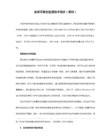
重点单词
1. achieve vt.完成;达到
2. achievement n.成就;功绩
3. condition n.条件;状况
4. welfare n.福利;福利事业
13. action n. 行为;动作;活动;作用
14. likely adj.预期的;可能的
15. nod v. 点头
16. general adj.一般的;大体的n.普通;将军;概要
17. avoid v. 避免;消除
必修4 Unit 3
重点单词
1. slide vi&vt. (使)滑动;(使)滑行n.滑;滑动;幻灯片
2. skin n.皮;皮肤’外壳
3. cruel adj.残酷的;令人痛苦的
4. content adj.满足的;满意的&n.满足&vt.使满足
18. Bottom n.&adj.底;底部;尽头;末端;&底部的
19. chew vt.&vi.咀嚼(食物等)
20. mouthful n.一口;满口
21. direct
22. star vt.&vi.标上星号
7. expand vt .vi使变大;伸展;阐述
8. circulate vt.vi.循环;流传
9. satisfied adj感到满意的
10. equip vt.vi.装备;配备
11. freedom n自由;民主
23. punish v.惩罚;处罚 punishment n.
8. be content with 对…满足
9 .badly off 穷的;缺少的
高三总复习必修四unit1-unit5
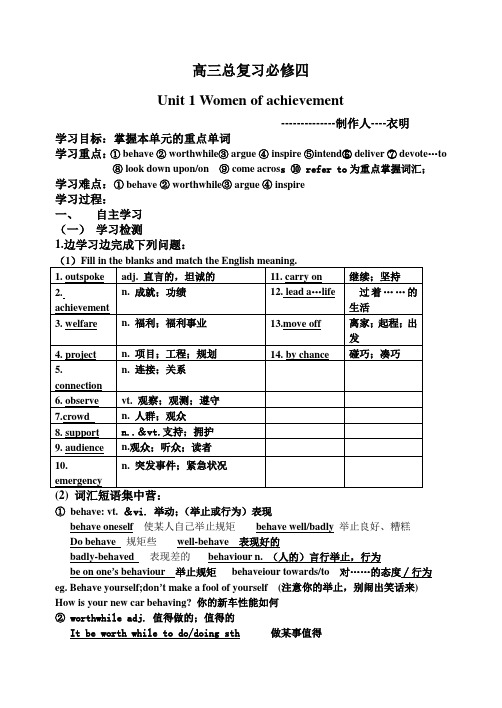
高三总复习必修四Unit 1 Women of achievement--------------制作人----衣明学习目标:掌握本单元的重点单词学习重点:① behave ② worthwhile③ argue ④ inspire ⑤intend⑥ deliver ⑦ devote…to⑧ look down upon/on ⑨ come acros s ⑩ refer to为重点掌握词汇;学习难点:① behave ② worthwhile③ argue ④ inspire学习过程:一、自主学习(一)学习检测1.边学习边完成下列问题:①behave: vt.&vi.举动;(举止或行为)表现behave oneself 使某人自己举止规矩behave well/badly 举止良好、糟糕Do behave 规矩些well-behave 表现好的badly-behaved 表现差的behaviour n. (人的)言行举止,行为be on one’s behaviour 举止规矩behaveiour towards/to 对……的态度∕行为eg. Behave yourself;don’t make a fool of yourself (注意你的举止,别闹出笑话来)How is your new car behaving? 你的新车性能如何② worthwhile adj. 值得做的;值得的It be worth while to do/doing sth 做某事值得eg. Buying the car at this price is not worthwhile. (以这样的价格买车不值得) Is it worthwile making/to make such an effort? (做这样的努力值得吗?)③argue v. 争论,辩论;说服;主张;认为argue with sb. about/over sth. 就某事和某人争辩argue sb. into/out of doing=persuade sb. to/not to do=persuade sb. into/out of doing 说服某人做/不做某事argue for/ against 支持/反对arguement n. 论点;争论;论据settle an argument 解决争端beyond arguement 无可争辩eg. We are always arguing with each other about/over money. (我们总是就金钱的问题而争论)They argued me into buying a new bike.He argued against smkoing,and insisted that it was beyongd argument that smoking was harmful to health.(他反对吸烟,而且坚持认为吸烟有害健康是无可争辩的事实) ④inspire vt. 鼓舞;激励;引发;赋予……灵感;激发inspire sb. to sth 鼓励某人某事inspire sb. to do sth. =encourage sb.to do sth. 鼓励某人做某事inspire sth. in sb. =inspire sb.with sth. 使某人产生……;鼓励某人……inspiration n. 灵感;启发;鼓舞人的事或人inspired adj. 受到鼓舞的;有灵感的inspiring adj. 鼓舞人心的;激励的eg. The teacher’s words inspired him with hope.=The teacher’s words inspired hope in him.The students were all inspired by the inspiring song.⑤intend v t&vi. 计划,打算be intend for 专供……使用,专为……而设计intend to do/doing 打算……intend sb. to do sth. 打算让某人做某事eg. be intended you to take over my career. (我打算让你接管我的事业)Today, I intended to finish reading this novel.(今天我打算读完这本小说)This kind of bicycle is intended for people who are too short.(这种自行车使专为身高太矮的人设计的)⑥deliver vt. 接生(小孩);递送;发表(演说等)Deliver a baby 接生小孩;生小孩deliver sth. to…把某物送到……delivery n. 送货,交付express delivery 快递on delivery 送达时;货到时eg. Some new books have been delivered to the school.(一些新书已经送到学校了) The actor delivered his speech in a soft voice.(演员用他温柔的声音演讲)⑦devote…to 献身于……,专心于……Be/get used to 习惯于get down to 开始认真做look forward to 盼望pay attention to 注意eg. He devoted all his time to his career.(他把他的全部时间都用在事业上了) The professor devoted himself devoted himself to ding research on cancer.(这位教授把一生都用在了研究癌症上)⑧ look down upon/on 轻视,看不起look up to (反义词)敬仰,尊重look into 调查,了解look up 查阅look out 当心,小心look on 旁观look back on 回首look forward to 盼望;期待look through 浏览;检查eg. I hope you don’t look down upon /on this kind of work.(我希望你不要看不起这种工作)She looks down on people who’ve never been to university.(她瞧不起没上过大学的人)You can’t look down upon a person because he is poor.(你不能因为某个人贫穷就瞧不起他)⑨ come across (偶然)遇到;发现Come up with 想到;提出 come about 发生Come of 脱落 come out 出版;出现Come over 越过,来到 come into being 形成,产生Come back 回来 come on 开始,进步,快点eg: I came across my English teacher on my way home.(在回家的路上,我偶然碰到了我的英语老师)I came across an old school friend in Oxford Street this morning.(今天早上我在牛津大街碰见一位老友)She came across some old photogtaphs in a drawer.(她在一个抽屉里偶然发现了一些旧照片⑩refer to 谈到;查阅;参考;查询;提及;指……而言refer to sb./sth. as 把某人/物称作refer sth. to 把某事提交refer sb. to 让某人向……求助reference n. 言及,提及;参考in/with reference to 关于without reference to 对……无关;不管eg: We agreed never to refer to the matter again.我们同意不再讨论这件事了。
2021英语人教版选择性必修第四册课件Unit1-5单元重点小结

单元重点小结
-1-
主题语境 人与社会 文学、艺术与体育
重点词汇
1.fiction n.小说;虚构的事 science fiction科幻小说(或影片等) fictional adj.虚构的;小说中的 fictionalise vt. 把(真人真事)改编成 小说(或电影) 2.test out检验;测试 give out发出,分发 try out测试,试验 let out发出(叫声等),加宽(衣服) run out用完,耗尽 try out for参加 选拔 3.more like更像是;更接近 less like不像 nothing like丝毫不像;绝 对不 there is nothing like没有比……好的 something like有点像 anything like与……相像,多用于疑问句或否定句中
单元重点小结
-12-
主题语境 人与社会 标志性景观
重点词汇
1.foundation n.创建;基础;地基 provide foundation for给……提供 依据 found vt.建立;创立 founder n.创始人 2.political adj.政治的 politics n.政治 politician n.政治家 politically adv.政治上 3.located adj.位于 be located in/at/between...位于…… locate vt.确定……的位置;定位 location n.地点;(电影的)外景拍摄 地 4.refer to查阅;谈到;涉及 refer to...as...把……称作…… refer to a book/dictionary查阅书/字典 reference n.参考;涉及;提到 in/with reference to关于;至于
高中英语人教版必修四全册unit1-5

Unit 1 Women of achievementA STUDENT OF AFRICAN WILDLIFEIt is 5:45 am and the sun is just rising over Gombe National Park in East Africa. Following Jane’s way of studying chimps, our group are all going to visit them in the forest. Jane has studied these families of chimps for many years and helped people understand how much they behave like humans. Watching a family of chimps wake up is our first activity of the day. This means going back to the place where we left the family sleeping in a tree the night before. Everybody sits and waits in the shade of the trees while the family begins to wake up and move off. Then we follow as they wander into the forest. Most of the time, chimps either feed or clean each other as a way of showing love in their family. Jane warns us that our group is going to be very tired and dirty by the afternoon and she is right. However, the evening makes it all worthwhile. We watch the mother chimp and her babies play in the tree. Then we see them go to sleep together in their nest for the night. We realize that the bond between members of a chimp family is as strong as in a human family.Nobody before Jane fully understood chimp behaviour. She spent years observing and recording their daily activities. Since her childhood she had wanted to work with animals in their own environment. However, this was not easy. When she first arrived in Gombe in 1960, it was unusual for a woman to live in the forest. Only after her mother came to help her for the first few months was she allowed to begin her project. Her work changed the way people think about chimps. For example, one important thing she discovered was that chimps hunt and eat meat. Until then everyone had thought chimps ate only fruit and nuts. She actually observed chimps as a group hunting a monkey and then eating it. She also discovered how chimps communicate with each other, and her study of their body language helped her work out their social system.For forty years Jane Goodall has been outspoken about making the rest of the world understand and respect the life of these animals. She has argued that wild animals should be left in the wild and not used for entertainment or advertisements. She has helped to set up special places where they can live safely. She is leading a busy life but she says: “Once I stop, it all comes crowding in and I remember the chimps in laboratories. It’s terrible. It affects me when I watch the wild chimps. I say to myself,‘Aren’t they lucky?’And then I think about small chimps in cages though they have done nothing wrong. Once you have seen that you can never forget…”She has achieved everything she wanted to do: working with animals in their own environment, gaining a doctor’s degree and showing that women can live in the forest as men can. She inspires those who want to cheer the achievements of women.WHY NOT CARRY ON HER GOOD WORK?I enjoyed English, biology, and chemistry at school, but which one should I choose to study at university? I did not know the answer until one evening when I sat down at the computer to do some research on great women of China.By chance I came across an article about a doctor called Lin Qiaozhi, a specialist in women’sdiseases. She lived from 1901 to 1983. It seemed that she had been very busy in her chosen career, travelling abroad to study as well as writing books and articles. One of them caught my eye. It was a small book explaining how to cut the death rate from having and caring for babies. She gave some simple rules to follow for keeping babies clean, healthy and free from sickness. Why did she write that? Who were the women that Lin Qiaozhi thought needed this advice? I looked carefully at the text and realized that it was intended for women in the countryside. Perhaps if they had an emergency they could not reach a doctor.Suddenly it hit me how difficult it was for a woman to get medical training at that time. That was a generation when girls’education was always placed second to boys’. Was she so much cleverer than anyone else? Further reading made me realize that it was hard work and determination as well as her gentle nature that got her into medical school. What made her succeed later on was the kindness and consideration she showed to all her patients. There was story after story of how Lin Qiaozhi, tired after a day’s work, went late at night to deliver a baby for a poor family who could not pay her.By now I could not wait to find out more about her. I discovered that Lin Qiaozhi had devoted her whole life to her patients and had chosen not to have a family of her own. Instead she made sure that about 50,000 babies were safely delivered. By this time I was very excited. Why not study at medical college like Lin Qiaozhi and carry on her good work? It was still not too late for me to improve my studies, prepare for the university entrance examinations, and …Unit 2 Working the landA PIONEER FOR ALL PEOPLEAlthough he is one of China’s most famous scientists, Yuan Longping considers himself a farmer, for he works the land to do his research. Indeed, his sunburnt face and arms and his slim, strong body are just like those of millions of Chinese farmers, for whom he has struggled for the past five decades. Dr Yuan Longping grows what is called super hybrid rice. In 1974, he became the first agricultural pioneer in the world to grow rice that has a high output. This special strain of rice makes it possible to produce one-third more of the crop in the same fields. Now more than 60﹪of the rice produced in China each year is from this hybrid strain.Born in 1930, Dr Yuan graduated from Southwest Agricultural College in 1953. Since then, finding ways to grow more rice has been his life goal. As a young man, he saw the great need for increasing the rice output. At that time, hunger was a disturbing problem in many parts of the countryside. Dr Yuan searched for a way to increase rice harvests without expanding the area of the fields. In 1950, Chinese farmers could produce only fifty million tons of rice. In a recent harvest, however, nearly two hundred million tons of rice was produced. These increased harvests mean that 22﹪of the world’s people are fedfrom just 7﹪of the farmland in China. Dr Yuan is now circulating his knowledge in India, Vietnam and many other less developed countries to increase their rice harvests. Thanks to his research, the UN has more tools in the battle to rid the world of hunger. Using his hybrid rice, farmers are producing harvests twice as large as before.Dr Yuan is quite satisfied with his life. However, he doesn’t care about being famous. He feels it gives him less freedom to do his research. He would much rather keep time for his hobbies. He enjoys listening to violin music, playing mah-jong, swimming and reading. Spending money on himself or leading a comfortable life also means very little to him. Indeed, he believes that a person with too much money has more rather than fewer troubles. He therefore gives millions of yuan to equip others for their research in agriculture.Just dreaming for things, however, costs nothing. Long ago Dr Yuan had a dream about rice plants as tall as sorghum. Each ear of rice was as big as an ear of corn and each grain of rice was as huge as a peanut. Dr Yuan awoke from his dream with the hope of producing a kind of rice that could feed more people. Now, many years later, Dr Yuan has another dream: to export his rice so that it can be grown around the globe. One dream is not always enough, especially for a person who loves and cares for his people.CHEMICAL OR ORGANIC FARMING?Over the past half century, using chemical fertilizers has become very common in farming. Many farmers welcomed them as a great way to stop crop disease and increase production. Recently, however, scientists have been finding that long-term use of these fertilizers can cause damage to the land and, even more dangerous, to people’s health.What are some of the problems caused by chemical fertilizers? First, they damage the land by killing the helpful bacteria and pests as well as the harmful ones. Chemicals also stay in the ground and underground water for a long time. This affects crops and, therefore, animals and humans, since chemicals get inside the crops and cannot just be washed off. These chemicals in the food supply build up in people’s bodies over time. Many of these chemicals can lead to cancer or other illnesses. In addition, fruit, vegetables and other food grown with chemical fertilizers usually grow too fast to be full of much nutrition. They may look beautiful, but inside there is usually more water than vitamins and minerals.With these discoveries, some farmers and many customers are beginning to turn to organic farming. Organic farming is simply farming without using any chemicals. They focus on keeping their soil rich and free of disease. A healthy soil reduces disease and helps crops grow strong and healthy. Organic farmers, therefore, often prefer using natural waste from animals as fertilizer. They feel that this makes the soil in their fields richer in minerals and so more fertile. This also keeps the air, soil, water and crops free from chemicals.Organic farmers also use many other methods to keep the soil fertile. They often change the kind of crop in each field every few years, for example, growing corn or wheat and then the nextyear peas or soybeans. Crops such as peas or soybeans put important minerals back into the soil, making it ready for crops such as wheat or corn that need rich and fertile soil. Organic farmers also plant crops to use different levels of soil, for example, planting peanuts that use the ground’s surface followed by vegetables that put down deep roots. Some organic farmers prefer planting grass between crops to prevent wind or water from carrying away the soil, and then leaving it in the ground to become a natural fertilizer for the next year’s crop. These many different organic farming methods have the same goal: to grow good food and avoid damaging the environment or people’s health.Unit 3 A taste of English humourA MASTER OF NONVERBAL HUMOURAs Victor Hugo once said, “Laughter is the sun that drives winter from the human face”, and up to now nobody has been able to do this better than Charlie Chaplin. He brightened the lives of Americans and British through two world wars and the hard years in between. He made people laugh at a time when they felt depressed, so they could feel more content with their lives.Not that Charlie’s own life was easy! He was born in a poor family in 1889. His parents were both poor music hall performers. You may find it astonishing that Charlie was taught to sing as soon as he could speak and dance as soon as he could walk. Such training was common in acting families at this time, especially when the family income was often uncertain. Unfortunately his father died, leaving the family even worse off, so Charlie spent his childhood looking after his sick mother and his brother. By his teens, Charlie had, through his humour, become one of the most popular child actors in England. He could mime and act the fool doing ordinary everyday tasks. No one was ever bored watching him – his subtle acting made everything entertaining.As time went by, he began making films. He grew more and more popular as his charming character, the little tramp, became known throughout the world. The tramp, a poor, homeless man with a moustache, wore large trousers, worn-out shoes and a small round black hat. He walked around stiffly carrying a walking stick. This character was a social failure but was loved for his optimism and determination to overcome all difficulties. He was the underdog who was kind even when others were unkind to him.How did the little tramp make a sad situation entertaining? Here is an example from one of his most famous films, The Gold Rush. It is the mid-nineteenth century and gold has just been discovered in California. Like so many others, the little tramp and his friend have rushed there in search of gold, but without success. Instead they are hiding in a small but on the edge of a mountain during a snowstorm with nothing to eat. They are so hungry that they try boiling a pair of leather shoes for their dinner. Charlie first picks out the laces and eats them as if they were spaghetti. Then he cuts off the leather top of the shoe as if it were the finest steak. Finally he tries cutting and chewing the bottom of the shoe. He eats each mouthful with great enjoyment. The acting is so convincing that it makes you believe that it is one of the best meals he has ever tasted!Charlie Chaplin wrote, directed and produced the films he starred in. In 1972 he was given a special Oscar for his outstanding work in films. He lived in England and the USA but spent his last years in Switzerland, where he was buried in 1977. He is loved and remembered as a great actor who could inspire people with great confidence.Unit 4 Body languageCOMMUNICATION: NO PROBLEM?Yesterday, another student and I, representing our university’s student association, went to the Capital International Airport to meet this year’s international students. They were coming to study at Beijing University. We would take them first to their dormitories and then to the student canteen. After half an hour of waiting for their flight to arrive, I saw several young people enter the waiting area looking around curiously. I stood for a minute watching them and then went to greet them.The first person to arrive was Tony Garcia from Colombia, closely followed by Julia Smith from Britain. After I met them and then introduced them to each other, I was very surprised. Tony approached Julia, touched her shoulder and kissed her on the cheek! She stepped back appearing surprised and put up her hands, as if in defence. I guessed that there was probably a major misunderstanding. Then Akira Nagata from Japan came in smiling, together with George Cook from Canada. As they were introduced, George reached his hand out to the Japanese student. Just at that moment, however, Akira bowed so his nose touched George’s moving hand. They both apologized – another cultural mistake!Ahmed Aziz, another international student, was from Jordan. When we met yesterday, he moved very close to me as I introduced myself. I moved back a bit, but he came closer to ask a question and then shook my hand. When Darlene Coulon from France came dashing through the door, she recognized Tony Garcia’s smiling face. They shook hands and then kissed each other twice on each cheek, since that is the French custom when adults meet people they know. Ahmed Aziz, on the contrary, simply nodded at the girls. Men from Middle Eastern and other Muslim countries will often stand quite close to other men to talk but will usually not touch women.As I get to know more international friends, I learn more about this cultural “body language”. Not all cultures greet each other the same way, nor are they comfortable in the same way with touching or distance between people. In the same way that people communicate with spoken language, they also express their feelings using unspoken “language” through physical distance, actions or posture. English people, for example, do not usually stand very close to others or touch strangers as soon as they meet. However, people from places like Spain, Italy or South American countries approach others closely and are more likely to touch them. Most people around the world now greet each other by shaking hands, but some cultures use other greetings as well, such as the Japanese, who prefer to bow.These actions are not good or bad, but are simply ways in which cultures have developed. I have seen, however, that cultural customs for body language are very general – not all members of a culture behave in the same way. In general, though, studying international customs can certainly help avoid difficulties in today’s world of cultural crossroads!SHOWING OUR FEELINGSBody language is one of the most powerful means of communication, often even more powerful than spoken language. People around the world show all kinds of feelings, wishes and attitudes that they might never speak aloud. It is possible to “read” others around us, even if they do not intend for us to catch their unspoken communication. Of course, body language can be misread, but many gestures and actions are universal.The most universal facial expression is, of course, the smile – its function is to show happiness and put people at ease. It does not always mean that we are truly happy, however. Smiles around the world can be false, hiding other feelings like anger, fear or worry. There are unhappy smiles, such as when someone “loses face” and smiles to hide it. However, the general purpose of smiling is to show good feelings.From the time we are babies, we show unhappiness or anger by frowning. In most places around the world, frowning and turning one’s back to someone shows anger. Making a fist and shaking it almost always means that someone is angry and threatening another person.There are many ways around the world to show agreement, but nodding the head up and down is used for agreement almost worldwide. Most people also understand that shaking the head from side to side means disagreement or refusal.How about showing that I am bored? Looking away from people or yawning will, in most cases, make me appear to be uninterested. However, if I turn toward and look at someone or something, people from almost every culture will think that I am interested. If I roll my eyes and turn my head away, I most likely do not believe what I am hearing or do not like it.Being respectful to people is subjective, based on each culture, but in general it is probably not a good idea to give a hug to a boss or teacher. In almost every culture, it is not usually good to stand too close to someone of a higher rank. Standing at a little distance with open hands will show that I am willing to listen.With so many cultural differences between people, it is great to have some similarities in body language. We can often be wrong about each other, so it is an amazing thing that we understand each other as well as we do!Unit 5 Different types of theme parkTHEME P ARKS – FUN AND MORE THAN FUNWhich theme park would you like to visit? There are various kinds of theme parks, with a different park for almost everything: food, culture, science, cartoons, movies or history. Some parks are famous for having the biggest or longest roller coasters, others for showing the famous sights and sounds of a culture. Whichever and whatever you like, there is a theme park for you! The theme park you are probably most familiar with is Disneyland. It can be found in several parts of the world. It will bring you into a magical world and make your dreams come true, whether you are travelling through space, visiting a pirate ship or meeting your favourite fairy tale or Disney cartoon character. As you wander around the fantasy amusement park, you may see Snow White or Mickey Mouse in a parade or on the street. Of course Disneyland also has many exciting rides, from giant swinging ships to terrifying free-fall drops. With all these attractions, no wonder tourism is increasing wherever there is a Disneyland. If you want to have fun and more than fun, come to Disneyland!Dollywood, in the beautiful Smoky Mountains in the southeastern USA, is one of the most unique theme parks in the world. Dollywood shows and celebrates America’s traditional southeastern culture. Although Dollywood has rides, the park’s main attraction is its culture. Famous country music groups perform there all year in indoor and outdoor theatres. People come from all over America to see carpenters and other craftsmen make wood, glass and iron objects in the old-fashioned way. Visit the candy shop to try the same kind of candy that American southerners made 150 years ago, or take a ride on the only steam-engine train still working in the southeast USA. You can even see beautiful bald eagles in the world’s largest bald eagle preserve. And for those who like rides, Dollywood has one of the best old wooden roller coasters, Thunderhead. It is world-famous for having the most length in the smallest space. Come to Dollywood to have fun learning all about America’s historical southeastern culture!If you want to experience the ancient days and great deeds of English knights and ladies, princes and queens, then England’s Camelot Park is the place for you. Every area of the park is modeled after life in the days of Knights of the Round Table. In one place, you can watch magic shows with Merlin the Wizard. If you want to see fighting with swords or on horseback, then the jousting area is a good place to visit. If you do well there, King Arthur may choose you to fight in the big jousting tournament. Do you like animals? Then visit the farm area, and learn how people in ancient England ran their farms and took care of their animals. To enter a world of fantasy about ancient England, come to Camelot Park!FUTURESCOPE – EXCITEMENT AND LEARNINGLast week I took a journey deep into space, to the end of the solar system, and was pulled into a black hole. Then I took a trip to Brazil and experienced surviving an airplane crash in the jungle. After that, I joined some divers and went to the bottom of the ocean to see strange blind creatures that have never seen sunlight. For a break, I took part in some car racing and then skied down some of the most difficult mountains in the world. I ended my travels by meeting face to face with a dinosaur, the terrible T-Rex, and survived the experience!I did all this in one great day at Futuroscope. Opened in 1987, Futuroscope is one of the largest space-age parks in the world. This science and technology-based theme park in France uses the most advanced technology. Its 3-D cinemas and giant movie screens provide brand new experiences of the earth and beyond. Visitors can get close to parts of the world they have never experienced, going to the bottom of the ocean, flying through the jungle or visiting the edges of the solar system. The amazing, up-to-date information together with many opportunities for hands-on learning makes the world come to life in a completely new way for visitors. Learning centres throughout the park let visitors try their own scientific experiments, as well as learn more about space travel, the undersea world and much more.I bought tickets for myself and my friends at the park’s entrance, but tickets are also available online. Futuroscope is not only for individuals, but is also the perfect mix of fun and learning for class outings. Classes or other large groups that let Futuroscope know their plans in advance can get the group admission rate. For anyone coming from out of town, Futuroscope has many excellent hotels nearby, most of which provide a shuttle service to the park. If driving, Futuroscope is within easy reach of the freeway. Plan your trip well before starting, since Futuroscope has so many shows, activities and great souvenir shops that it is difficult to see them all. Come ready to walk a lot - be sure to wear some comfortable sneakers or other walking shoes!。
人教版新课标 必修四 units 1-5 重点词汇变形整理

必修四重点词汇变形special英[ˈspɛʃ()l]美[ˈspɛʃl]adj.特别的n.特别的事物;特别节目;特别活动;特别产品specialist英[ˈspɛʃ()lɪst]美[ˈspɛʃ()l st]n.专家specialize英[ˈspɛʃ()lʌɪz]美[ˈspɛʃˌlaɪz](亦作-ise)v.专攻,专门研究;成为…的专家connect英[kˈnɛkt]美[kˈnɛkt]v.连接;联结connection英[kˈnɛkʃ()n]美[kˈnɛkʃ()n]n.联系,关系;connecter英[kˈnekt]n.连结者,连结物behave英[bɪˈheɪv]美[bˈheɪv]v.待人接物;以某种态度对待;循规蹈矩,举止端正behaviour英[bɪˈheɪvj](〈美〉behavior)n.行为,举止,待人接物的方式observe英[bˈzːv]美[bˈz rv]verb注意到,察觉到;观察到;履行(社会、法律、伦理或宗教义务);遵守,遵奉,遵从observer英[bˈzːv]美[bˈz rv r]noun观察者observation英[ɒbzˈveɪʃ()n]美[ˌɑbzrˈveɪʃ()n]n.观察;(以观察为依据的)言论;评论generate英[ˈdʒɛn reɪt]美[ˈdʒɛnˌreɪt]v.引发(某种情感);造成(某种情况);使发生generator英[ˈdʒɛn reɪt]美[ˈdʒɛnˌreɪd r]n.发生器generation英[dʒɛnˈreɪʃ()n]美[ˌdʒɛnˈreɪʃ()n]n.[总称]一代人,同代人;产生,发生consider英[k nˈsɪd]美[k nˈsɪd r]v.(尤指决定前)考虑,思考,细想considerate英[k nˈsɪd()r t]美[k nˈsɪd r t]adj.体贴的,体谅的;考虑周到的consideration英[k nsɪdˈreɪʃ()n]美[k nˌsɪd rˈeɪʃ()n]n.(尤指一段时间的)考虑,细想;报酬;酬资,酬金;〈古〉重要(性)equip英[ɪˈkwɪp]美[ˈkwɪp]v.配备,装备e qu ipme n t英[ɪˈkwɪpm()nt]美[ˈkwɪpm nt]n.设备;器材;用具confuse英[k nˈfjuːz]美[k nˈfjuz]v.使迷惑,使困惑confusion英[k nˈfjuːʒ()n]美[k nˈfjuʒn]n.[mass noun];不确定;疑惑;困惑,糊涂,迷茫confusing英[k nˈfju:ziŋ]美[k nˈfjuzɪŋ]adj.令人困惑的,混乱的,混淆的confused英[k nˈfjuːzd]美[k nˈfjuzd]adj.(人)不能清晰思考的;昏乱的;糊涂的,迷惑的;不知所措的pr oduct英[ˈprɒdʌkt]美[ˈprɑdkt]n.(经加工可出售的)作品;产品;production英[prˈdʌkʃ()n]美[prˈd kʃ()n]n.生产;制造;出示,拿出;提供;(电影,戏剧,录音)制作,监制discover英[dɪˈskʌv]美[dˈsk v r]v.发现;〈古〉泄漏(秘密)discovery英[dɪˈskʌv()ri]美[dˈsk v()ri]n.发现;被发现;astonish英[ˈstɒnɪʃ]美[ˈstɑnɪʃ]v.使惊讶astonishment英[ˈstɒnɪʃm nt]美[ˈstɑnɪʃmnt]n.惊讶;惊愕astonishing英[sˈtɔnɪʃɪŋ]adj.使人吃惊的,惊人的astonished英[ˈstɑnɪʃt]adj.吃惊的fortunate英[ˈfɔːtʃ()n t]美[ˈfɔrtʃ()n t]adj.好运的;幸运的fortunately英[ˈfɔːtʃ()n tli]美[ˈfɔrtʃ()n tli]adv.幸运地,幸亏unfortunate英[ʌnˈfɔːtʃ()n t]美[ˌnˈfɔrtʃ()n t]adj.倒霉的;不幸的unfortunately英[ʌnˈfɔːtʃ()n tli]美[ˌnˈfɔrtʃ()n tli]adv.遗憾的是,不幸的是,可惜的是convince英[k nˈvɪns]美[k nˈvɪns]v.使确信;使信服convinced英[k nˈvɪnst]美[k nˈvɪnst]adj.确信的;确定的convincing英[k nˈvɪnsɪŋ]美[k nˈvɪnsɪŋ]adj.有说服力的;令人信服的direct英[dɪ'rekt]adv.直接地adj.直达的,径直的;直接的;(人或其行为)直截了当的;坦率的;(与表面)垂直的;不倾斜的v.控制;管理;统治;将(某物)对准;朝向(某个特定的方向或特定的人);命令;指示director英[dɪˈrɛkt]美[dɪˈrɛkt r]n.主管;局长;处长;院长;校长;所长;科长;主任direction英[dɪ'rekʃn]n.方向;管理;指导directive英[dɪˈrɛktɪv]美[dˈrɛktɪv]adj.管理的,指导的explain英[ɪkˈspleɪn]美[ɪkˈspleɪn]v.解释(观点,情况,问题);讲解;阐明;说明explanation英[ɛksplˈneɪʃ()n]美[ˌɛksplˈneɪʃ()n]n.解释;说明defend英[dɪˈfɛnd]美[dˈfɛnd]v.保卫,保护defender英[dɪˈfɛnd]美[dˈfɛnd r]n.保卫(或维护)者;(体育用语)防守队员;. defence英[dɪˈfɛns](〈美〉defense)n.防卫,保卫;申诉vary英[ˈvɛːri]美[ˈvɛri]v.变化;有不同;呈差异various英[ˈvɛːrɪs]美[ˈvɛri s]adj.不同的;各种各样的variety英[vˈrʌɪti]美[vˈraɪdi]n.变化;多样性;variation英[ˌve rɪ'eɪʃn]n.变化;变更;变动;变化;变异fantasy英['fænt sɪ]n.想象(力);幻想曲v.〈诗,文〉想象;幻想fantastic英[fanˈtastɪk]美[fænˈtæstɪk]adj.想像出来的,怪诞的;不现实的,异想天开的adv ance英[d'vɑːns]v.(尤指有目的地)前进;借(钱)给n.前进;预付款;挑逗,勾引,接近(尤指想要示爱、求爱)adj.提前的,预先的adv anced英[adˈvɑːnst]美[dˈvænst]adj.高级的,先进的adv antage英[dˈvɑːntɪdʒ]美[dˈvæn(t)ɪdʒ]n.有利条件,优势disadv antage英[ˌdɪs d'vɑːntɪdʒ]n.不利条件;不利环境。
人教版必修四unit单词+语法
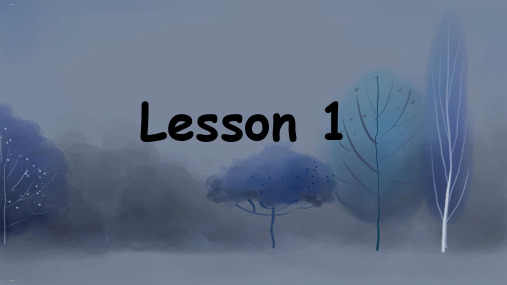
人教版必修四unit单词+语法
8. devote devote all her life to
v. 致力于;奉献于 将自己的一生献给…/致力于…
devote sth /oneself to +n./pron./doing 奉献......于......
9. encourage
在阴凉处 Trees shade the streets.
shade...from/against...
使…免受…的照射
She shaded her eyes from/against the sun. 她遮着眼睛,以避开阳光。
人教版必修四unit单词+语法
15. observe
obsan organized way 13. behave:
井井有条地 ① vi. 行为,举止;为人处事
She behaved well. ② vt./vi.行为检点,守规矩
The young lady behaved very bravely. + (oneself)使检点,使守规矩
人教版必修四unit单词+语法
5. improve improvement
6. condition improve prision conditions
7. concern concern oneself with be concerned about/for…
人教版必修四unit单词+语法
v. 提高;改善 n. 提高;改善 条件;情况;环境 改善监狱环境 v. 影响,关系到,涉及 n. 担心,关心
人教版必修四unit单词+语法
n. 关系,联系 the connection between A and B 和......有联系 v. 连接,联系 把A和B连接/联系在一起
人教高中英语必修四全册重点单词解析unit1unit2unit3unit4unit5
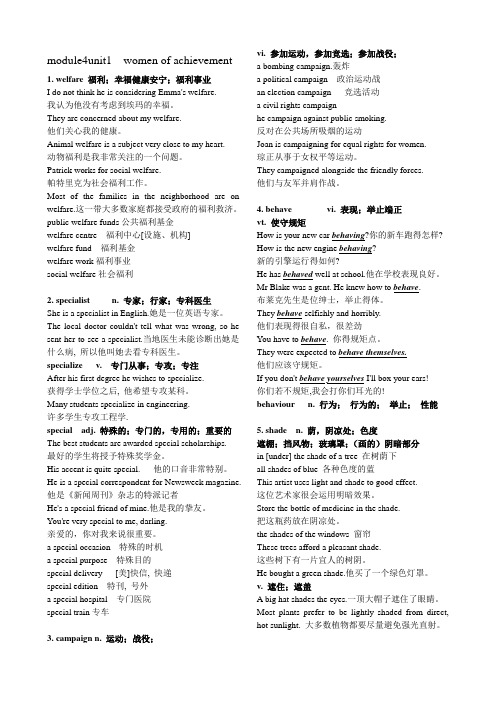
module4unit1 women of achievement1. welfare 福利;幸福健康安宁;福利事业I do not think he is considering Emma's welfare.我认为他没有考虑到埃玛的幸福。
They are concerned about my welfare.他们关心我的健康。
Animal welfare is a subject very close to my heart.动物福利是我非常关注的一个问题。
Patrick works for social welfare.帕特里克为社会福利工作。
Most of the families in the neighborhood are on welfare.这一带大多数家庭都接受政府的福利救济。
public welfare funds公共福利基金welfare centre 福利中心[设施、机构]welfare fund 福利基金welfare work福利事业social welfare社会福利2. specialist n. 专家;行家;专科医生She is a specialist in English.她是一位英语专家。
The local doctor couldn't tell what was wrong, so he sent her to see a specialist.当地医生未能诊断出她是什么病, 所以他叫她去看专科医生。
specialize v. 专门从事;专攻;专注After his first degree he wishes to specialize.获得学士学位之后, 他希望专攻某科。
Many students specialize in engineering.许多学生专攻工程学.special adj. 特殊的;专门的,专用的;重要的The best students are awarded special scholarships.最好的学生将授予特殊奖学金。
- 1、下载文档前请自行甄别文档内容的完整性,平台不提供额外的编辑、内容补充、找答案等附加服务。
- 2、"仅部分预览"的文档,不可在线预览部分如存在完整性等问题,可反馈申请退款(可完整预览的文档不适用该条件!)。
- 3、如文档侵犯您的权益,请联系客服反馈,我们会尽快为您处理(人工客服工作时间:9:00-18:30)。
高中英语必修四全单元词汇复习Unit1-5Unit1一词组互译1.献身于_______________2.醒来________________3.蔑视;瞧不起_________________4.照顾;喜爱______________5.接生_____________6.使自己参与;关心______________7.偶然遇见______________8.前提是,如果___________9引起某人注意___________10.也,又,和____________11.arguefor____________12.doresearchon_______________13.ofone’sown_________14.moveoff_____________15.carryon_________________16.beintendedfor____________17.Bychance_____________18crowdin_____________19.leada...life___________20.referto_____________二完成句子●他把一生都贡献在帮助残疾人事业上.He_________allhislife_________________thedisabledpeople.●这本字典是给小孩用的.(beintendedto)Thedictionary_______________________children.●他对细节不关心He________________________________thedetails.4.我希望你不要看不起这种工作Ihopeyou____________________________thiskindofwork.5.努力改善这个工厂工人们的劳动条件是值得做的事____________________toimprovetheworkingconditionsfortheworkersofthisfactory.6.他打算早上起程。
He_____________________inthemorning7.我突然意识到他是在向我求婚。
Suddenlyit________________hewastryingtoaskmetomarryhim.一、他和他妻子争论度假的最好地方。
He___________hiswife______thebestplaceforaholiday.二、帮助他们意味着帮助你自己Tohelpthem_________________________.三、在我离开的时候你继续工作。
Youshould_________________whileI’maway.三请用括号内所给词的正确形式填空1.Forhim,threeyears_______(be)reallyalongtime.2._______(be)everybodygoingtotakepartinthegamethisafternoon?3.Myfamily_______(be)thelargestoneinourvillage.Besides,myfamily______(be)allpartymembers.4.Thewholeclass________(be)nowlisteningtotheteacherattentively.5.Thenews______(be)veryexciting.6.Tolearnoneortwoforeignlanguages_______(be)veryimportantnowadays.7.Thelastandmostdifficultlesson_______(be)Lesson14.8.I,who_______yourfriend,willtrymybesttohelpyou.9.Thescientistandengineer_______(have)inventedanewmachine.10.Alice,togetherwithherfriends,_______(be)punishedforhavingbrokentheschoolrules.11.Everygirlandeveryboy_______(have)therighttojointheclub.12.—_______(be)eithersheoryoutogoandattendthemeeting?—NeithershenorI________(be).13.Ancientandmodernhistory_____(be)thesubjectswearestudying.14.Manyascientist_______(have)devotedtheirlivestoscience.15.Theold_______(be)respectedinourcountry.16.Theteacherandthewriter______(praise)inpublicagaintheotherday.17.JackandTomtogetherwithMike_______(study)hardrecently.18.JackaswellasTomandMike________(play)computergamesatthistimelastnight.四单项选择1.Thechildrendonotknowhowto_______themselvesdecentlyattheparty.A.actB.performC.behaveD.advance2.Theofficersnarrowlyescapedinthehotbattle.A.havekilledB.tokillC.tobekilledD.beingk illed3.They______thetrainuntilitdisappearedinthedistance.A.sawB.watchedC.noticedD.observed4.–Wheredidyou______ourchemistryteacher?--Itwasinthesupermarket______Iboughtmooncakes.eto,whereeacross,thateacross,whereeto,that5.Onlywhenyouridentityhasbeenchecked______.A.youareallowedinB.youwillbeallowedinC.willyouallowinD.willyoubeallowedin6.Thepresidentspokeatthebusinessmeetingfornearlyanhourwithout______hisnotes.A.bringingupB.referringtoC.lookingforD.tryingon7.–I’vegotaheadacheagain!--Sorrytohearthat.Walktoworkeve rydayandyou’llsoonbackin______.A.situationB.conditionC.positionD.attention8.Itisdifficultforusto______conversationwithallthisnoisearoundus.A.carryonB.accountforC.bringupD.getacross9.Apoetandartist______comingtospeaktousaboutChineseliteratureandpaintingtomorrowafternoon.A.isB.areC.wasD.were10.______toreachthemonthephone,wesentanemailinstead.A.FailB.FailedC.TofailD.Havingfailed11.Istillremember______chessinclassbymyteacherabouttwentyyearsago.A.tobecaughttoplayB.beingcaughtplayingC.catchingplayD.havingcaughtplaying12.“Y oucan’tcatchme!”Janetshouted,__________away.A.runB.runningC.torunD.ran13.Everyman,womanandchild_______sinehistory,enoughatleast,tosurviveintheworld. AknowsBknowCisknownDareknown14.Onlyinthisway_________progressinyourEnglish. AyoumakeBcanyoumakeCyoubeabletomakeDwillyouabletomake15.Onethousanddollars______alargesumofmoneyinhereyes.AareBisCshouldbeDseemtobe16.WangPing,aswellasotherstudents________physicsandchemistry. AlikeBlikesCislikingDhaveliked17.Heistheonlyoneofthestudentswho_______awinnerofscholarshipforthreeyears. AisBareChavebeenDhasbeen18.---Whathappenedtoyourshoes?---Theywant.A.tomendB.beingmendedC.mendingD.mended19.Theboyisonlyfiveyearsold,butheisquiteusedthetelephone.A.toanswerB.toansweringC.ofansweringD.byansweringUnit2一词组互译1.摆脱______________2.对---感到满意_____________3.幸亏,由于_____________4.宁愿;宁可____________5.集中(精力,注意力等)于__________6.使...免受(影响,伤害等)_____________7导致,造成_________________8.逐渐增强,建立,开发______________9遗憾地说___________________10.为....而斗争_________________11careabout______________12carefor______________ 13inaddition____________14beconsideredas/tobe___________15ratherthan____________ 16beequippedwith_________17berichin____________18everyfewyears_____________19turnto__________20preventfrom_________二完成句子1.Jane宁愿呆在家里也不愿参加那样的聚会。
